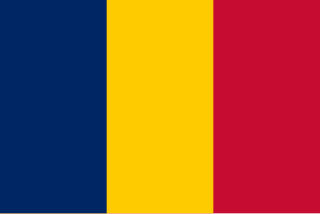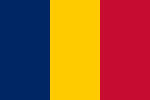
Chad, officially the Republic of Chad, is an independent state at the crossroads of North and Central Africa. The landlocked country is bordered by Libya to the north, Sudan to the east, the Central African Republic to the south, Cameroon to the southwest, Nigeria to the southwest, and Niger to the west. Chad has a population of 16 million, of which 1.6 million live in the capital and largest city of N'Djamena. With a total area of around 1,300,000 km2 (500,000 sq mi), Chad is the fifth-largest country in Africa and the twentieth largest nation by area in the world.

The Western canon is the body of high-culture literature, music, philosophy, and works of art that are highly valued in the West, works that have achieved the status of classics. However, not all these works originate in the Western world, and such works are also valued throughout the globe. It is "a certain Western intellectual tradition that goes from, say, Socrates to Wittgenstein in philosophy, and from Homer to James Joyce in literature".

Children's literature or juvenile literature includes stories, books, magazines, and poems that are created for children. Modern children's literature is classified in two different ways: genre or the intended age of the reader, from picture books for the very young to young adult fiction.

N'Djamena is the capital and largest city of Chad. It is also a special statute region, divided into 10 districts or arrondissements.

Bohemianism is a social and cultural movement that has, at its core, a way of life away from society's conventional norms and expectations. The term originates from the French bohème and spread to the English-speaking world. It was used to describe mid-19th-century non-traditional lifestyles, especially of artists, writers, journalists, musicians, and actors in major European cities.

PEN International is a worldwide association of writers, founded in London in 1921 to promote friendship and intellectual co-operation among writers everywhere. The association has autonomous International PEN centres in more than 100 countries.
Literary fiction, mainstream fiction, non-genre fiction, serious fiction, high literature, artistic literature, and sometimes just literature, are labels that, in the book trade, refer to market novels that do not fit neatly into an established genre ; or, otherwise, refer to novels that are character-driven rather than plot-driven, examine the human condition, use language in an experimental or poetic fashion, or are simply considered serious art.
The island of Mauritius is home to many languages, and Mauritian literature exists in French, English, Creole and Indian languages. Major themes in Mauritian literature include exoticism, multiracialism and miscegenation, racial and social conflicts, indianocéanisme, and—more recently—post-modernism and post-structuralism currents, such as coolitude.

The Chad National Museum is the national museum of Chad. Since November 2010, the national heritage has been highlighted in modern premises opposite the Palace of January 15, seat of the National Assembly, and next to an identical building housing the National Library.

The Hausa are a native ethnic group in West Africa. They speak the Hausa language, which is the second most spoken language after Arabic in the Afro-Asiatic language family. The Hausa are a culturally homogeneous people based primarily in the Sahelian and the sparse savanna areas of southern Niger and northern Nigeria respectively, numbering around 86 million people, with significant populations in Benin, Cameroon, Ivory Coast, Chad, Central African Republic, Togo, Ghana, as well as smaller populations in Sudan, Eritrea, Equatorial Guinea, Gabon, Senegal, Gambia. Predominantly Hausa-speaking communities are scattered throughout West Africa and on the traditional Hajj route north and east traversing the Sahara, with an especially large population in and around the town of Agadez. Other Hausa have also moved to large coastal cities in the region such as Lagos, Port Harcourt, Accra, Abidjan, Banjul and Cotonou as well as to parts of North Africa such as Libya over the course of the last 500 years. The Hausa traditionally live in small villages as well as in precolonial towns and cities where they grow crops, raise livestock including cattle as well as engage in trade, both local and long distance across Africa. They speak the Hausa language, an Afro-Asiatic language of the Chadic group. The Hausa aristocracy had historically developed an equestrian based culture. Still a status symbol of the traditional nobility in Hausa society, the horse still features in the Eid day celebrations, known as Ranar Sallah. Daura is the cultural center of the Hausa people. The town predates all the other major Hausa towns in tradition and culture.

Palestinian literature refers to the Arabic language novels, short stories and poems produced by Palestinians. Forming part of the broader genre of Arabic literature, contemporary Palestinian literature is often characterized by its heightened sense of irony and the exploration of existential themes and issues of identity. References to the subjects of resistance to occupation, exile, loss, and love and longing for homeland are also common.

Algerian literature has been influenced by many cultures, including the ancient Romans, Arabs, French, Spanish, and Berbers. The dominant languages in Algerian literature are French and Arabic.

Angolan literature has its origins in the mid-19th century. The diversity of Angola's culture is reflected in the diversity of its literature, which traditionally has been combative and satirical.
Benin is a country in western Africa. It consists of a narrow wedge of territory extending northward for about 420 mi (680 km) from the Gulf of Guinea in the Atlantic Ocean, on which it has a 75-mile seacoast, to the Niger River, which forms part of Benin’s northern border with Niger. The official capital is Porto-Novo, but Cotonou is Benin’s largest city, its chief port, and its de factoadministrative capital.

Egyptian literature traces its beginnings to ancient Egypt and is some of the earliest known literature. Ancient Egyptians were the first to develop written literature, as inscriptions or in collections of papyrus, precursors to the modern book.

A Hibernophile is a person who is fond of Irish culture, Irish language and Ireland in general. Its antonym is Hibernophobe. The word originates from "Hibernia", the word used by the ancient Romans to refer to Ireland.
Citizens or residents of the United Kingdom whose origins lie in Guyana are a part of the country's British Caribbean community. Guyana was a former British colony, British Guiana, responsible for moving large numbers of Africans and Indians for labour in the sugar industry. British Guyanese are notable for their contributions to literature and music.
Tunisian literature exists primarily in Arabic and in French. Arabic literature in Tunisia dates to the 7th century, with the arrival of Arab civilization in the region. Arabic literature is more important than francophone literature—which followed the introduction of the French protectorate in 1881—both in volume and value. The national bibliography lists 1,249 non-academic books published in 2002 in Tunisia, of which 885 titles are in Arabic. Nearly a third of these books are intended for children.
The anthropologist Leon E. Stover says of science fiction's relationship to anthropology: "Anthropological science fiction enjoys the philosophical luxury of providing answers to the question "What is man?" while anthropology the science is still learning how to frame it". The editors of a collection of anthropological SF stories observed:
Anthropology is the science of man. It tells the story from ape-man to spaceman, attempting to describe in detail all the epochs of this continuing history. Writers of fiction, and in particular science fiction, peer over the anthropologists' shoulders as the discoveries are made, then utilize the material in fictional works. Where the scientist must speculate reservedly from known fact and make a small leap into the unknown, the writer is free to soar high on the wings of fancy.
Québécois are people associated with Quebec. The term is most often used in reference to either descendants of the French settlers in Quebec or people of any ethnicity who live and trace their origins in the province of Quebec.













